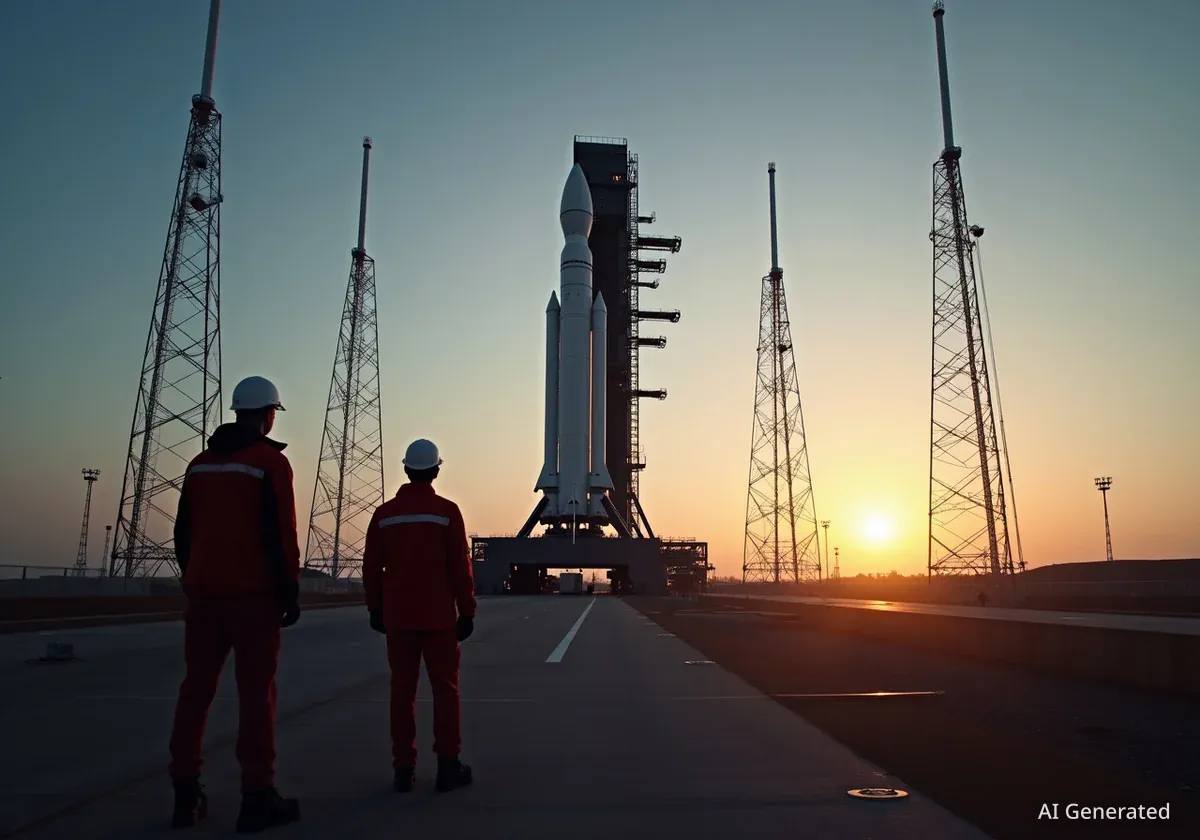A new executive order, numbered 14335, has been issued to reform regulations governing the U.S. commercial space industry. The order, titled “Enabling Competition in the Commercial Space Industry,” aims to simplify licensing, upgrade spaceport infrastructure, and create clear pathways for new space activities. The directive introduces significant changes across four main areas to increase the pace of commercial launches by 2030.
The policy shift addresses long-standing industry concerns that complex and slow regulatory processes have hindered growth. Key government agencies, including the Federal Aviation Administration (FAA), Department of Commerce, and Department of Transportation, are now mandated to implement these reforms, which focus on deregulation and streamlining approvals.
Key Takeaways
- Executive Order 14335 aims to accelerate growth in the U.S. commercial space sector.
- The order focuses on four key areas: launch licensing, spaceport infrastructure, novel space activities, and government accountability.
- Regulatory reviews for launch and reentry will be expedited, with a focus on cutting environmental review times.
- The FAA is instructed to update its regulations to accommodate modern space vehicle technology, such as autonomous flight termination systems.
- The order establishes new leadership roles within the government to champion deregulation and innovation in the space industry.
Streamlining Launch and Reentry Approvals
The first major component of the executive order targets the regulatory bottlenecks that have slowed down commercial launch operations. The directive specifically instructs the Federal Aviation Administration to reduce delays in the licensing process for both launches and reentries.
To achieve this, the FAA is encouraged to use its existing authorities to speed up or eliminate certain environmental reviews. This includes leveraging categorical exclusions under the National Environmental Policy Act (NEPA) for launch activities that are known to have no significant environmental impact. This measure is designed to prevent repetitive and unnecessary assessments for routine operations.
Modernizing FAA Regulations
The executive order also mandates a comprehensive review of current FAA licensing rules, which some in the industry have criticized as outdated and overly complex. The FAA must reevaluate and potentially rescind regulations that are not suitable for modern spacecraft equipped with advanced safety features, like autonomous flight termination systems.
Furthermore, the review will consider whether vehicles that operate similarly to aircraft should be subject to less stringent requirements. According to the directive, any rules that are “too attenuated” from public safety or national security concerns will be identified for removal. This overhaul is intended to make the approval process more efficient and reflective of current technology.
Focus on Efficiency
The order grants the FAA authority to exempt certain launch or reentry permits from specific legal requirements if they are deemed unnecessary for protecting public health, safety, property, or U.S. national security interests.
Expanding Spaceport Infrastructure
The second pillar of the executive order addresses the need for more robust and modern spaceport infrastructure across the country. To support this goal, the policy directs several government departments to work together to remove obstacles to spaceport development.
The Secretary of Commerce, in collaboration with the departments of Defense and Transportation and NASA, will evaluate how state compliance with the Coastal Zone Management Act affects spaceport expansion. The evaluation will consider whether the act's provision giving states approval authority over federal projects in coastal zones should be revoked for space-related projects. This signals a willingness to prioritize national space objectives over potential local opposition.
Interagency Cooperation and Environmental Reviews
To further streamline development, the order calls for a memorandum of understanding between the Department of Defense, the Department of Transportation, and NASA. This agreement will align their respective review processes for spaceport projects, eliminating redundant steps while ensuring that national security launch capabilities are maintained.
The policy also pushes for expedited environmental reviews for spaceport construction. The Council on Environmental Quality is tasked with establishing new categorical exclusions under NEPA for common spaceport development activities. In a significant move, the order suggests that agencies consider using the rarely invoked exemption process of the Endangered Species Act, highlighting the administration's view of commercial space as a national security imperative.
Authorizing Novel Space Activities
The third area of focus is creating a clear and efficient process for authorizing “novel” space activities. These are cutting-edge private ventures, such as in-space manufacturing or satellite servicing, that do not fit neatly into existing regulatory frameworks.
Defining 'Novel' Activities
Novel space activities refer to new commercial ventures beyond traditional launch and satellite communications. Examples include asteroid mining, private space stations, and on-orbit servicing, which currently lack a dedicated licensing authority in the U.S. government.
The executive order tasks the Secretary of Commerce with proposing a streamlined authorization process. This new framework must provide applicants with clear requirements and a definitive timeline for decisions. The goal is to eliminate uncertainty and encourage investment in innovative space technologies.
The proposal is directed to incorporate feedback from other relevant agencies and to establish a process with the goal of “expediting and streamlining authorizations to enable American space competitiveness and superiority.”
This initiative centralizes authority, likely within the Commerce Department’s Office of Space Commerce, a move widely supported by the commercial space industry. It replaces a previous, more complex proposal that would have split responsibility between the Department of Commerce and the Department of Transportation.
Enhancing Leadership and Accountability
Finally, the executive order implements organizational changes within the government to ensure its priorities are carried out effectively. These changes are designed to create internal advocates for deregulation and to elevate the importance of commercial space within key departments.
The order mandates the creation of several key positions:
- New Advisor in the Department of Transportation: The Transportation Secretary will establish a new advisor role dedicated to fostering innovation and deregulation in the commercial space industry.
- Senior FAA Appointee: The FAA Administrator must appoint a senior political appointee as the Associate Administrator for Commercial Space Transportation, ensuring the office is led by someone accountable to the administration's policy goals.
- Elevated Office of Space Commerce: The Office of Space Commerce will be moved to report directly to the Secretary of Commerce, increasing its visibility and influence on the department's agenda.
These structural adjustments are intended to embed the executive order's objectives into the daily operations of the government. By placing politically accountable leaders in key roles, the administration aims to ensure consistent progress toward speeding up approvals and supporting the rapid growth of the U.S. commercial space sector.





